Israel will respond to Iran's weekend missile and drone attack on its territory, the country's military chief of staff has said.
"This launch of so many missiles, cruise missiles, and drones into Israeli territory will be met with a response," Chief of Staff Herzi Halevi said, speaking from the Nevatim airforce base in southern Israel, which sustained some damage in the attack.
In a separate statement Israeli military spokesman Rear Admiral Daniel Hagari said: "We will do whatever is necessary to protect the state of Israel, and we will do it at the opportunity and the time we will choose."
Iran launched the attack over a suspected Israeli airstrike on its embassy compound in Syria on 1 April that killed seven Iranian Revolutionary Guards officers including two senior commanders.
Mr Hagari said those killed in the strike on the Iranian consulate in Damascus on 1 April had engaged in "terrorism against Israel" in the first official comment on the attack.
"To the best of my knowledge those who were killed in Damascus were members of the Quds Force.
"These were people who engaged in terrorism against the State of Israel," Mr iagari said when asked at a briefing about the strike.
"Among these terrorist operatives there were Hezbollah members and Iranian helpers. There was not a single diplomat there as far as I know. I don't know of any civilian who was killed in this attack," he added.
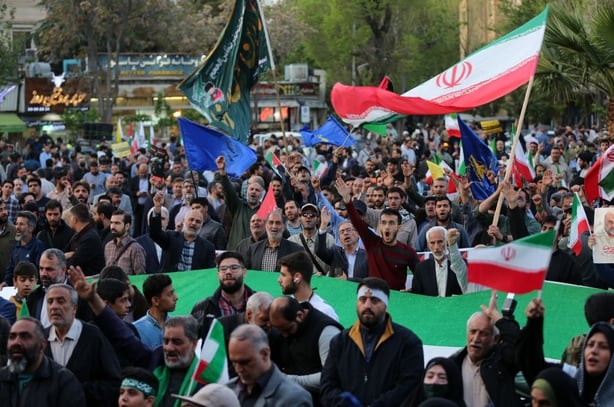
Israeli Prime Minister Benjamin Netanyahu summoned his war cabinet in Tel Aviv for the second time in less than 24 hours, a government source said.
Two senior officials signalled yesterday that retaliation was not imminent and Israel would not act alone but the results of Monday's talks were not yet known.
Iran's attack - made in retaliation for a suspected Israeli airstrike on its embassy compound in Damascus - has increased fears of open warfare between Israel and Iran and heightened concerns that violence rooted in the Gaza war is spreading further in the region.
With the danger of open warfare erupting between Israel and Iran, and tension high over the war in Gaza, US President Joe Biden told Mr Netanyahu that the United States will not participate in any Israeli counteroffensive against Iran, US officials said.
However, speaking this afternoon, US Secretary of State Antony Blinken said the United States does not want to see any escalation in hostilities with Iran, but will continue to defend Israel after it was attacked by Tehran.
Iran attack 'spectacular and embarrassing failure' - White House
"We don't seek escalation, but we'll continue to support the defence of Israel and to protect our personnel in the region," Mr Blinken said at the start of a meeting with Iraq's Deputy Prime Minister Mohammed Ali Tamim.
US National Security Council spokesman John Kirby described Iran's attack as a "spectacular and embarrassing failure".
"We've seen reporting that the Iranians meant to fail, and this spectacular and embarrassing failure was all by design," Mr Kirby told a briefing.
"All of this is categorically false," he added.
Since the start of the war in Gaza on 7 October, clashes have erupted between Israel and Iran-aligned groups in Lebanon, Syria, Yemen and Iraq. Israel said four of its soldiers were wounded hundreds of metres inside Lebanese territory overnight.
It appeared to be the first such known incident since the Gaza war erupted, although there have been months of exchanges of fire between Israel and Lebanon's armed group Hezbollah.
Israel urged by European allies to show restraint
Britain, France, Germany and the European Union's foreign policy chief all joined Washington and United Nations Secretary General Antonio Guterres in calling for restraint.
"We're on the edge of the cliff and we have to move away from it," Josep Borrell, the EU's High Representative for Foreign Affairs and Security Policy, told Spanish radio station Onda Cero.
"We have to step on the brakes and reverse gear," he added.
British Prime Minister Rishi Sunak said the Group of Seven (G7) major democracies were working on a package of coordinated measures against Iran.
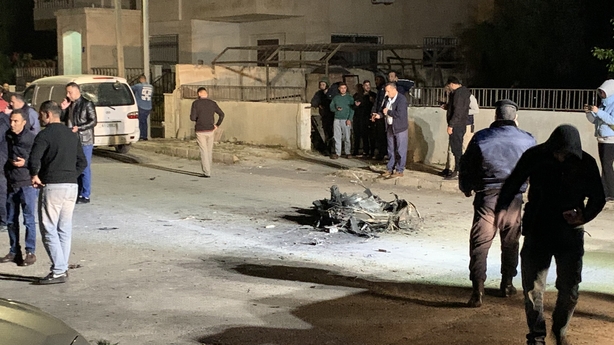
"I spoke to my fellow G7 leaders, we are united in our condemnation of this attack," Mr Sunak said in parliament.
Italy, which holds the rotating presidency of the G7, said it was open to new sanctions against individuals engaged against Israel.
In an interview with Reuters, Italian Foreign Minister Antonio Tajani said new sanctions would need the backing of all the G7. He suggested any new measures would be focused on individuals rather than whole nations.
"If we need to have more sanctions for people clearly engaged against Israel, supporting for example terrorism, supporting Hamas, it is possible to do it," Mr Tajani said.
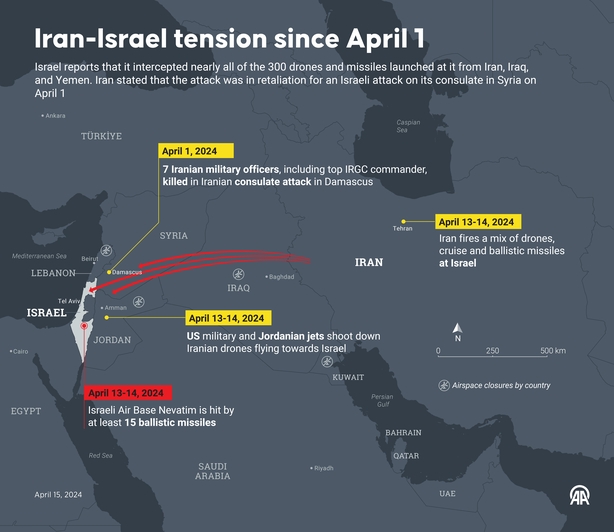
French President Emmanuel Macron urged Israel to set its sight on isolating Iran rather than escalating the situation.
German Chancellor Olaf Scholz warned Iran not to carry out more attacks and said Israel must also contribute to de-escalation.
Russia has refrained from criticising its ally Iran in public over the strikes but expressed concern about the risk of escalation and also called for restraint.
"Further escalation is in no one's interests," Kremlin spokesman Dmitry Peskov said.
Most were shot down by Israel's Iron Dome defence system and with help from the US, Britain, France and Jordan.
The only serious injury reported within Israel was a seven-year-old who was hurt by shrapnel.
Asian shares fell and gold prices rose as risk sentiment took a hit, but oil prices dipped and Israel's shekel rose against the dollar.
"An attack was largely priced in the days leading up to it," Warren Patterson said, head of commodities strategy at ING.
"Also, the limited damage and the fact that there was no loss of life means that maybe Israel's response will be more measured," he said.
"But clearly, there is still plenty of uncertainty and it all depends on how Israel now responds," he added.
We need your consent to load this rte-player contentWe use rte-player to manage extra content that can set cookies on your device and collect data about your activity. Please review their details and accept them to load the content.Manage Preferences
Iran's attack also caused travel disruption, with at least a dozen airlines cancelling or rerouting flights, and Europe's aviation regulator reaffirming advice to airlines to use caution in Israeli and Iranian airspace.
Two senior Israeli ministers have signaled that retaliation is not imminent and that Israel will not act alone.
"We will build a regional coalition and exact the price from Iran in the fashion and timing that is right for us," centrist minister Benny Gantz said.
Defence Minister Yoav Gallant said Israel had an opportunity to form a strategic alliance "against this grave threat by Iran".
Israel remained on high alert, but authorities lifted some emergency measures that had included a ban on some school activities and caps on large gatherings.
Iranian army chief of staff Major General Mohammad Bagheri warned Israel not to retaliate and told Washington that US bases could be attacked if it helps Israel do so.
Warning of attack
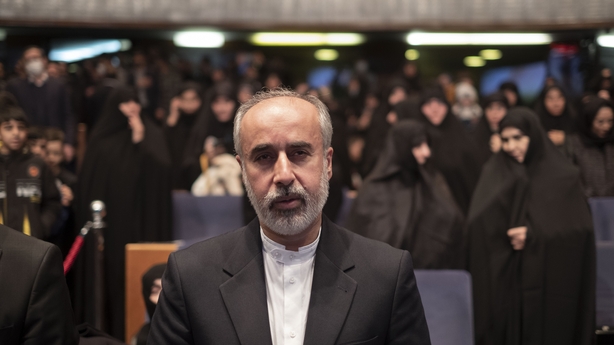
Iranian Foreign Minister Hossein Amir-Abdollahian said Tehran had informed the United States that the attack on Israel would be limited and for self-defence, and that regional neighbours had been informed of the planned strikes 72 hours in advance.
However, Iranian Foreign Ministry spokesperson Nasser Kanaani said that no pre-arranged agreement was made with any country prior to the weekend attack.
Turkish, Jordanian and Iraqi officials said that Iran gave wide notice days before its drone and missile attack on Israel, but US officials said Tehran did not warn Washington and that it was aiming to cause significant damage.
Turkey's Foreign Ministry said it had spoken to both Washington and Tehran before the attack, adding it had conveyed messages as an intermediary to be sure reactions were proportionate.
"Iran said the reaction would be a response to Israel's attack on its embassy in Damascus and that it would not go beyond this. We were aware of the possibilities. The developments were not a surprise," said a Turkish diplomatic source.
Live updates: Middle East situation on 'cliff edge', says EU
One senior official in Mr Biden's administration denied Mr Amir-Abdollahian's statement, saying Washington did have contact with Iran through Swiss intermediaries but did not get notice 72 hours in advance.
"That is absolutely not true," the official said. "They did not give a notification, nor did they give any sense of ...'these will be the targets, so evacuate them.'"
Tehran sent the United States a message only after the strikes began and the intent was to be "highly destructive" said the official, adding that Iran's claim of a widespread warning may be an attempt to compensate for the lack of any major damage from the attack.
"We received a message from the Iranians as this was ongoing, through the Swiss. This was basically suggesting that they were finished after this, but it was still an ongoing attack. So that was (their) message to us," the US official said.
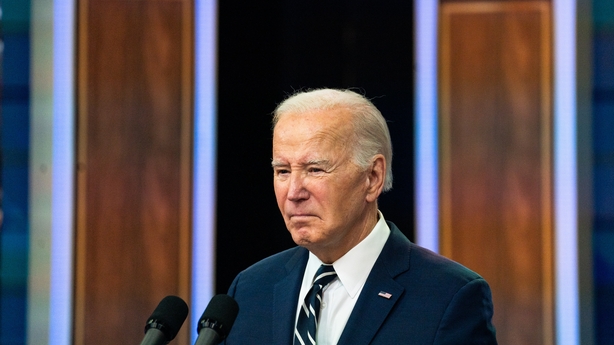
Iraqi, Turkish and Jordanian officials each said Iran had provided early warning of the attack last week, including some details.
US officials said on Friday and Saturday they expected an imminent attack and urged Iran against one, with Mr Biden tersely saying his only message to Tehran was: "Don't."
Two Iraqi sources, including a government security adviser and a security official, said Iran had used diplomatic channels to inform Baghdad about the attack at least three days before it happened.
The exact timing of the attack was not disclosed at that point, but was passed to Iraqi security and military authorities hours before the strikes, allowing Baghdad to close its airspace and avoid fatal accidents.

"The government clearly understood from the Iranian officials that the US military in Iraq was also aware of the attack in advance," said the Iraqi security official.
Israel's army meanwhile confirmed its troops were wounded inside Lebanese territory after earlier saying four soldiers were injured in an overnight explosion "in the area of the northern border".
"We confirm that the incident occurred inside Lebanon," an army spokesperson told AFP.
Earlier, Lebanon's Hezbollah said it had detonated "explosive devices" targeting Israeli soldiers who it alleged had crossed into Lebanese territory.
